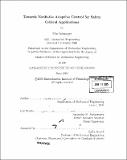Towards verifiable adaptive control for safety critical applications
Author(s)
Schwager, Mac
DownloadFull printable version (3.946Mb)
Other Contributors
Massachusetts Institute of Technology. Dept. of Mechanical Engineering.
Advisor
Anuradha M. Annaswamy.
Terms of use
Metadata
Show full item recordAbstract
To be implementable in safety critical applications, adaptive controllers must be shown to behave strictly according to predetermined specifications. This thesis presents two tools for verifying specifications relevant to practical direct-adaptive control systems. The first tool is derived from an asymptotic analysis of the error dynamics of a direct adaptive controller and uncertain linear plant. The analysis yields a so called Reduced Linear Asymptotic System, which can be used for designing adaptive systems to meet transient specifications. The tool is demonstrated in two design examples from flight mechanics, and verified in numerical simulation. The second tool developed is an algorithm for direct-adaptive control of plants with magnitude saturation constraints on multiple inputs. The algorithm is a non-trivial extension of an existing technique for single input systems with saturation. Boundeness of all signals is proved for initial conditions in a compact region. In addition, the notion of a class of multi-dimensional saturation functions is introduced. The saturation compensation technique is demonstrated in numerical simulation. Finally, these tools are applied to design a direct-adaptive controller for a realistic multi-input aircraft model to accomplish control reconfiguration in the case of unforeseen failure, damage, or disturbances. A novel control design for incorporating control allocation and reconfiguration is introduced. The adaptive system is shown in numerical simulation to have favorable transient qualities and to give a stable response with input saturation constraints.
Description
Thesis (S.M.)--Massachusetts Institute of Technology, Dept. of Mechanical Engineering, 2005. Includes bibliographical references (p. 97-101).
Date issued
2005Department
Massachusetts Institute of Technology. Department of Mechanical EngineeringPublisher
Massachusetts Institute of Technology
Keywords
Mechanical Engineering.